## Xbox’s Handheld Dreams on Ice? 🥶 Insider Gaming Hints at Project ‘Keystone’ Delay
The whispers in the gaming community have been growing louder. Could Xbox’s ambitious foray into the handheld market be facing a serious setback? According to insider gaming reports, Project ‘Keystone’, the rumored Xbox handheld console, is reportedly on hold.

The 2027 Handheld: A Long-Term Vision
First-Party Development
Microsoft’s reported plans to develop a first-party handheld console, slated for a 2027 release alongside its next-generation console, represent a significant commitment to the handheld market. This move suggests that Microsoft sees handheld gaming as a crucial platform for its future, potentially rivaling its first-party offerings on the Xbox Series X/S.
Developing a handheld console internally allows Microsoft to tightly control the hardware and software experience, ensuring optimal performance and integration with their gaming ecosystem. This level of control could be vital in differentiating their handheld from existing competitors and attracting developers to create exclusive titles.
Shifting Focus
The decision to temporarily postpone development on the 2027 handheld, according to insider reports, highlights the dynamic nature of the gaming industry. Microsoft’s prioritization of enhancing Windows 11 gaming performance for devices like Project Keenan, the codename for its partnership with ASUS, suggests a focus on maximizing the potential of its existing platforms before venturing into new hardware territories.
This strategic shift could be attributed to several factors. Improving Windows 11’s gaming capabilities might be crucial for Microsoft to compete effectively with platforms like Steam Deck and maintain its position in the PC gaming market. Additionally, focusing resources on refining the software experience for Project Keenan could serve as a valuable learning opportunity for developing future handheld devices.
Competing in the Handheld Market
The handheld gaming market is already populated by established players like Nintendo with the Switch and Valve with the Steam Deck. Microsoft entering this space would undoubtedly shake things up, bringing its vast portfolio of games and services to a new platform.
However, Microsoft also faces several challenges. The handheld market is highly competitive, with established brands and loyal customer bases. Microsoft would need to offer a compelling value proposition to attract gamers and convince them to switch from existing platforms.
Moreover, Microsoft needs to ensure its handheld can compete with existing devices in terms of performance, battery life, and screen quality. The success of Project Keenan, the ASUS partnership, will likely serve as a valuable benchmark for Microsoft’s future handheld endeavors.
What This Means for Gamers
The Future of Xbox Handhelds
While the postponement of the 2027 handheld development is undoubtedly disappointing news for fans eagerly anticipating a dedicated Xbox handheld, it doesn’t necessarily signal the end of Microsoft’s ambitions in this space.
Microsoft’s commitment to developing a first-party handheld remains intact, and the temporary hold on development could be seen as a strategic move to ensure a polished and successful product launch. The company likely wants to avoid rushing the project and delivering a subpar experience.
Alternative Handheld Options
While waiting for a potential Xbox handheld, gamers have several compelling alternative options available.
- Steam Deck: Valve’s innovative handheld PC offers impressive performance and a vast library of PC games.
- Nintendo Switch: Nintendo’s hybrid console remains a popular choice for its strong first-party titles and versatile gameplay experience.
- Aya Neo: This company offers a range of powerful handheld gaming PCs, providing an alternative to the Steam Deck.
Gamestanza’s Take
The postponement of Microsoft’s 2027 handheld development highlights the complexities and challenges of navigating the ever-evolving gaming landscape. While it’s disappointing for fans eager to experience an official Xbox handheld, it’s important to recognize that strategic decisions often require prioritizing certain projects over others.
Ultimately, the success of Microsoft’s handheld ambitions hinges on several factors, including the performance of Project Keenan, the company’s ability to deliver a compelling value proposition, and the overall reception of the gaming community. Gamestanza will continue to monitor developments closely and provide insights into the future of Xbox handheld gaming.
Conclusion
So, there you have it. Xbox’s foray into the handheld market, a prospect that had gamers buzzing with anticipation, appears to be hitting the pause button. While the reasons remain shrouded in speculation, the potential impact is undeniable. This decision throws a wrench into Xbox’s ambition to dominate across all platforms, potentially leaving a gap in the market for competitors like Nintendo and even cloud gaming services. But the story doesn’t end here. The gaming landscape is a dynamic beast, constantly evolving. This setback for Xbox could spark a creative resurgence, pushing them to explore innovative solutions within their existing ecosystem. Will we see enhanced streaming capabilities, deeper integration with PC Game Pass, or perhaps even a surprising pivot towards a new type of handheld altogether? Only time will tell. One thing’s for sure, the future of gaming is unwritten. This development, while seemingly a stumble, could be the catalyst for Xbox to forge a new, even bolder path. The game is afoot, and the players are waiting to see what move comes next.
